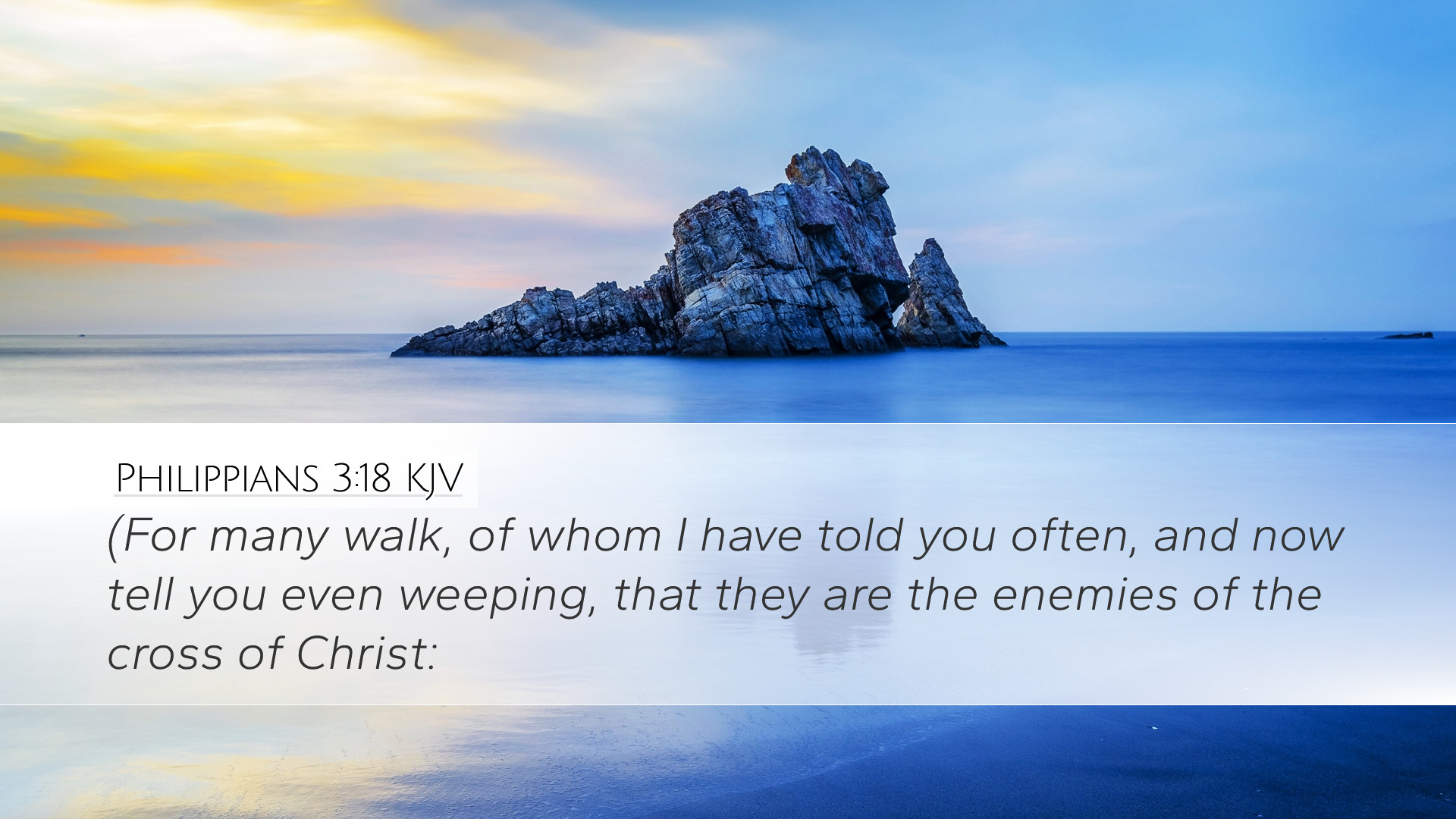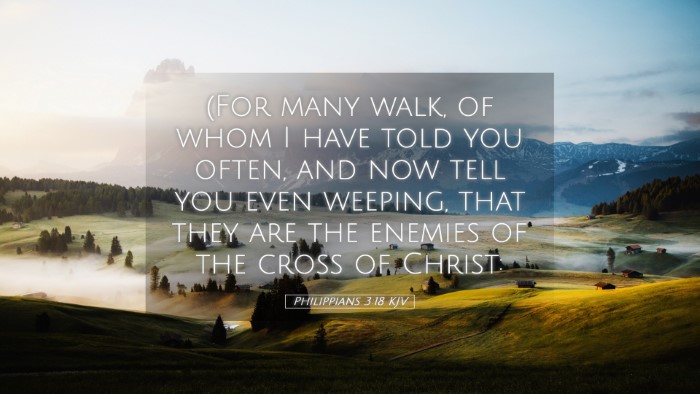Commentary on Philippians 3:18
Verse: Philippians 3:18
"For many walk, of whom I have told you often, and now tell you even weeping, that they are the enemies of the cross of Christ."
Introductory Remarks
This verse expresses the Apostle Paul’s profound concern for those who oppose the teachings of Christ. It serves as a poignant reminder of the solemn nature of apostolic ministry, where joy is often mingled with sorrow for the spiritual condition of others. Paul here refers to a significant challenge Christians face, highlighting the existence of false teachers and believers whose lives do not reflect the message of the Gospel.
Insights from Matthew Henry
Matthew Henry emphasizes the emotional depth of Paul’s statement, recognizing the "weeping" as an expression of deep pastoral care and sorrow for the souls of those who stray from the truth. Henry notes that the "enemies of the cross of Christ" do not simply oppose Christ in doctrine; they also challenge the fundamental call to a life of sacrifice and discipleship.
Furthermore, Henry categorizes these enemies into two broad groups: those who are inherently opposed to the principles of Christ and those who, while appearing to be part of the community, live according to their own desires. This serves as a critical warning for believers to be vigilant about their own walks and the influences they allow into their lives.
Insights from Albert Barnes
Albert Barnes contributes a deeply analytical perspective on the phrase "many walk." He explains that this indicates a lifestyle choice and not merely a sporadic act. This lifestyle reflects a deliberate rejection of the tenets of the faith, asserting that such people live as enemies of the cross.
Barnes also interprets Paul’s weeping as indicative of his genuine compassion and pastoral heart. He underlines that the cross represents the core of Christian doctrine—the sacrifice of Christ for humanity. Thus, those who live contrary to this principle not only jeopardize their own souls but lead others astray.
He further points out that the mention of enemies highlights the necessity of distinguishing between those who genuinely follow Christ and those whose actions betray the essence of the faith. This distinction is crucial for the integrity of the Christian community.
Insights from Adam Clarke
Adam Clarke offers a rich theological exploration of the phrase "enemies of the cross." He intricately connects this to the socio-political context of the early church, reflecting on how outside pressures and the allure of worldly success often entice believers to compromise their faith.
Clarke discusses how these enemies may include not only outright opponents of Christianity but also those who, through false doctrine or behavior, undermine the message of the cross by promoting a gospel that is devoid of its sacrificial nature. He argues that true Christianity entails self-denial and a willingness to take up one's cross—a calling that has been muddied by societal influences.
He concludes this section by calling believers to maintain their vigilance and commitment to the message of the cross, viewing it not only as a historical event but as a continuing challenge in their spiritual lives.
Theological Implications
This verse is pivotal as it stresses the continual struggle against false teachings in Christian communities. It illustrates that the integrity of the Gospel is at stake and that believers must remain steadfast in their commitment to the message of Christ.
The emotional charge of Paul’s words reflects the gravity with which he views this issue. It reinforces the idea that true discipleship requires discernment along with a heartfelt commitment to the truth of the Gospel.
Moreover, the recognition of enemies within the church reminds us of the necessity for sound doctrine and accountability. It tells us that the fight against erroneous teachings is not merely an intellectual battle but deeply connected to our spiritual health and the health of the wider community.
Pastoral Applications
For pastors and church leaders, Philippians 3:18 serves as a profound reminder of the responsibilities they bear towards their congregations. The call to weep for those who stray from the cross is both a personal and communal call to action.
- Encourage Genuine Discipleship: Leaders should prioritize cultivating authentic relationships with God among their members, guiding them toward a life that embodies self-denial and cross-bearing.
- Promote Sound Teaching: Clear doctrine should always be a priority. Engaging with the scripture honestly and thoroughly helps to disarm the influences Paul cautions against.
- Foster a Culture of Accountability: Establishing an environment where believers can discuss doubts and challenges openly, offering each other support reflects the communal nature of faith.
- Cultivating Compassion: Emulating Paul’s example, leaders must develop an empathetic approach toward those who are struggling with their faith, portraying genuine love and concern.
Conclusion
Philippians 3:18 serves as a sobering reminder of the challenges faced by believers in a world where various teachings vie for attention. The emotional weight carried by Paul encapsulates the seriousness with which he approaches the matter of false teachings, calling the church to deliberate engagement with the truth of the cross. As we reflect on this scripture, may we be emboldened to uphold and share the pivotal message of Christ’s sacrifice, fostering an enriching environment for faith to flourish.


